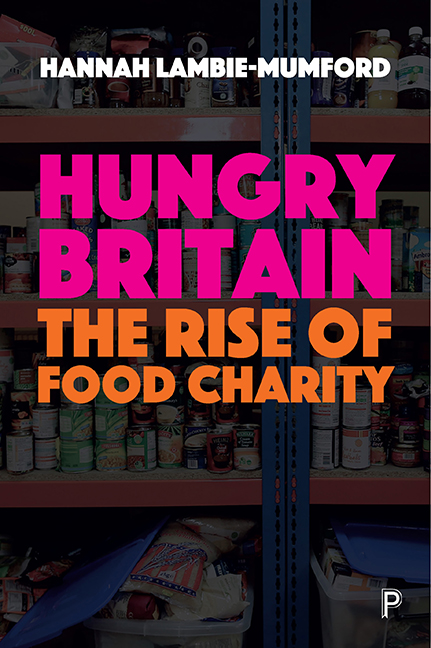Book contents
- Frontmatter
- Dedication
- Contents
- List of figures
- List of abbreviations
- Acknowledgements
- Foreword
- One Introduction
- Two Hunger and charitable emergency food provision in the UK and beyond
- Three Theories of the food insecurity ‘problem’ and the right to food ‘solution’
- Four Food charity: the ‘other’ food system
- Five The sustainability of food charity
- Six Food charity as caring
- Seven Food charity and the changing welfare state
- Eight Conclusion
- References
- Index
Seven - Food charity and the changing welfare state
Published online by Cambridge University Press: 05 April 2022
- Frontmatter
- Dedication
- Contents
- List of figures
- List of abbreviations
- Acknowledgements
- Foreword
- One Introduction
- Two Hunger and charitable emergency food provision in the UK and beyond
- Three Theories of the food insecurity ‘problem’ and the right to food ‘solution’
- Four Food charity: the ‘other’ food system
- Five The sustainability of food charity
- Six Food charity as caring
- Seven Food charity and the changing welfare state
- Eight Conclusion
- References
- Index
Summary
The focus of this chapter is the role of the state in respecting, protecting and fulfilling the human right to food. Building on the work in Chapter Six on the role of charities, the role of the state is explored through the lens of social protection, specifically the ways in which state-provided social protection, through a welfare state, impacts on food insecurity and interacts with the rise of emergency food provision. The particular focus here is on the relationship between the changing welfare state in the UK and the rise of emergency food provision in the form of food banks. Social protection can be provided through civil society-or state-based organisations, and emergency food provision could be seen to represent an example of civil society-based protection. While De Schutter (2013, p.4) highlights the importance of informal, community-based social protection, from a right to food perspective the state is seen as the ultimate duty bearer for ensuring the right is protected, respected and fulfilled for all. Within a right to food context, universality, rights and entitlements are also important, particularly in relation to the fulfilment of the right to food when people are unable to access food for themselves. Food charity, then, insofar as it is neither universal nor an entitlement, poses a challenge to the right to food approach. This chapter explores the relationship between the formal welfare state in the UK and the rise of emergency food provision, and looks in particular at how changes to the welfare state are impacting on both the need for and shape of this ad-hoc charitable provision.
State-managed social protection takes many forms, and includes pensions and labour market policy as well as parts of healthcare. However, this chapter specifically examines aspects of the welfare state that protect people from poverty; namely, social security and services providing assistance to those in or at risk of poverty or out of work. It focuses on the relationship between these parts of the welfare state and the rise of emergency food provision as civil society-based social protection. This is a particularly important site for investigation, given the experiences of this relationship in other country contexts.
- Type
- Chapter
- Information
- Hungry BritainThe Rise of Food Charity, pp. 113 - 132Publisher: Bristol University PressPrint publication year: 2017

